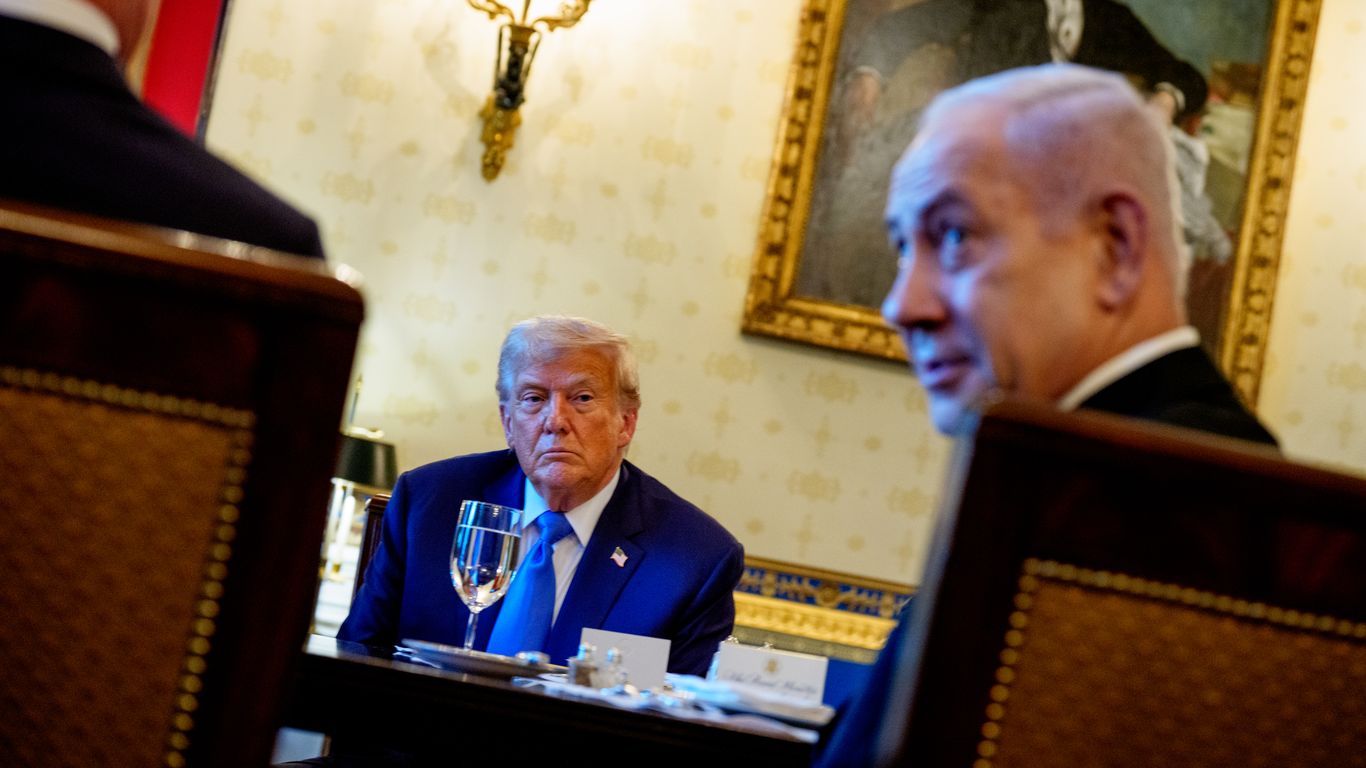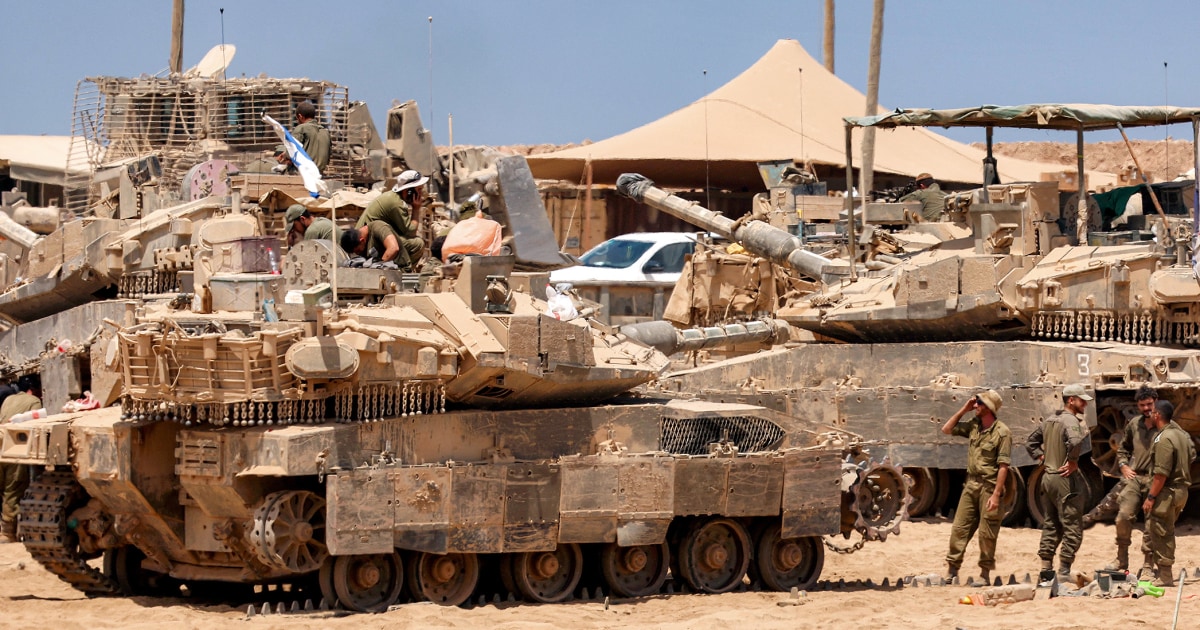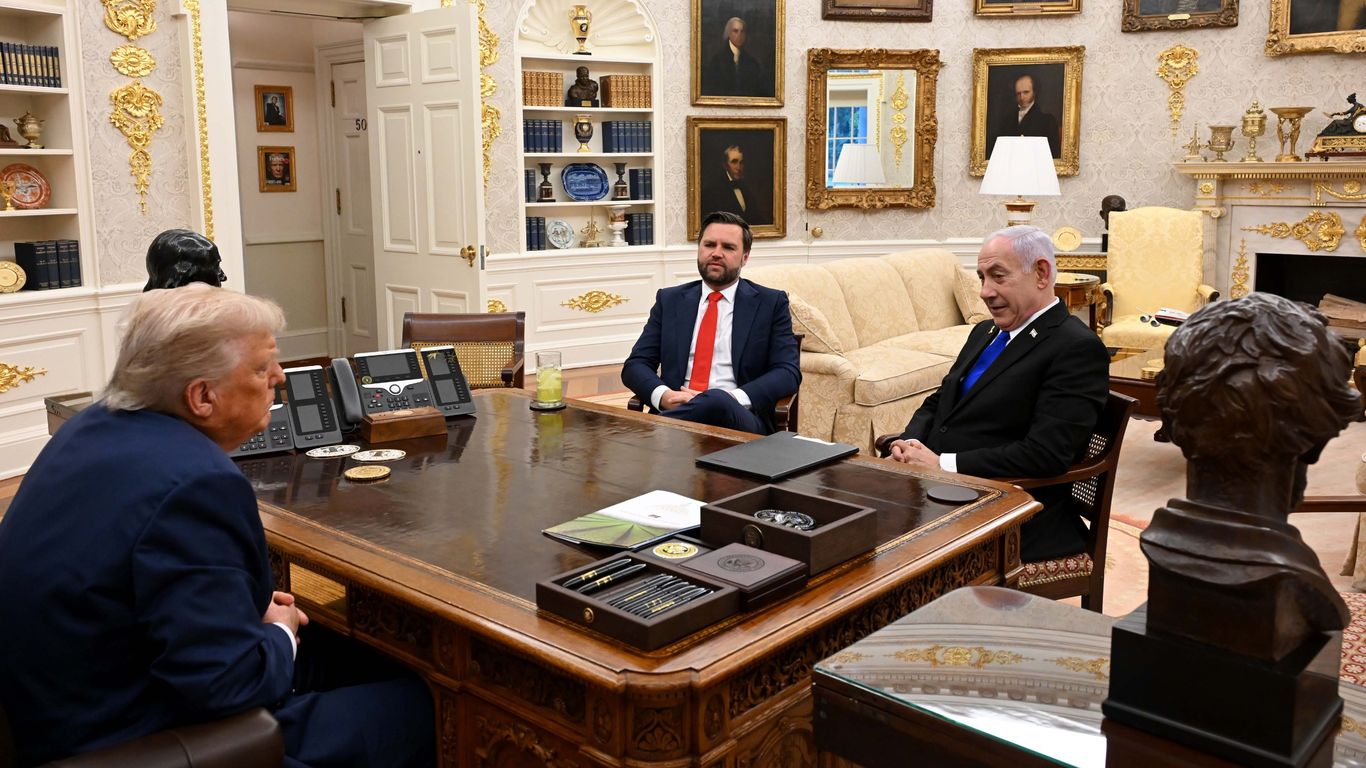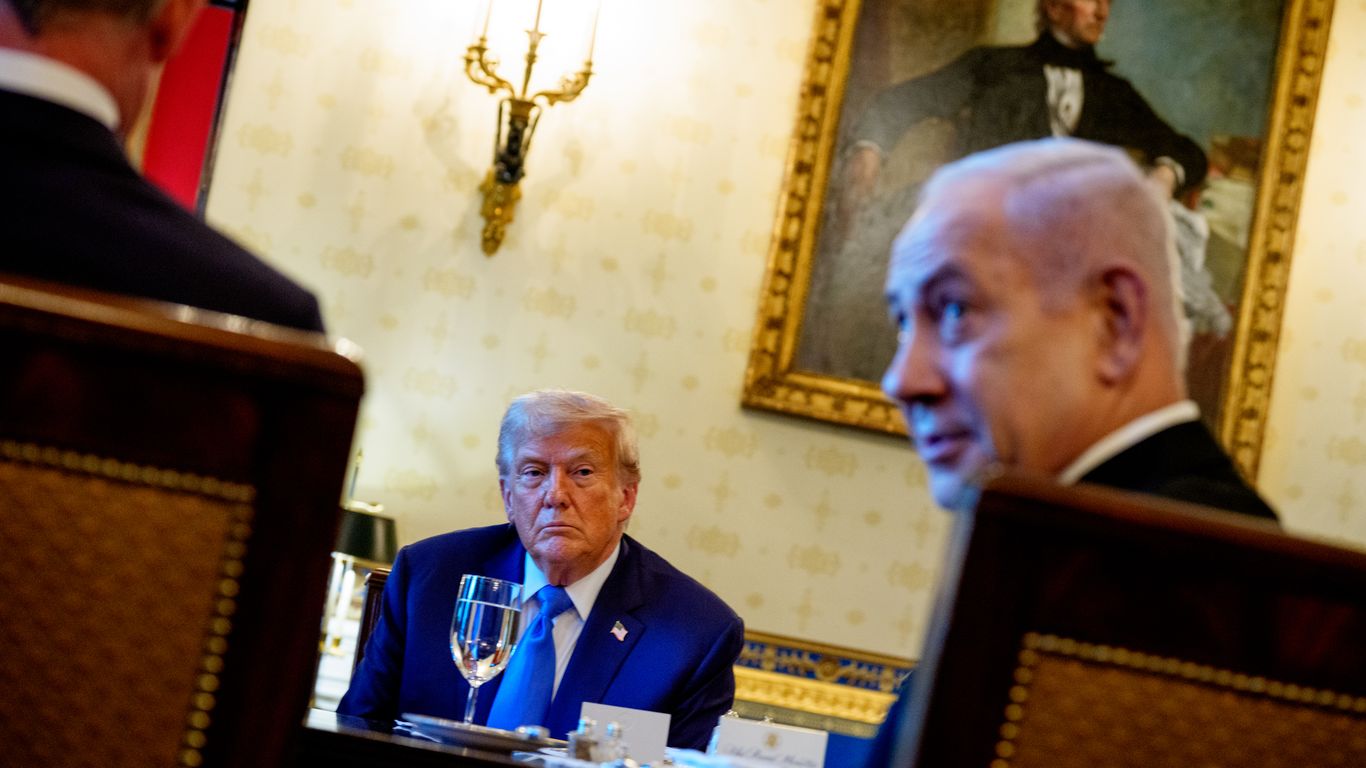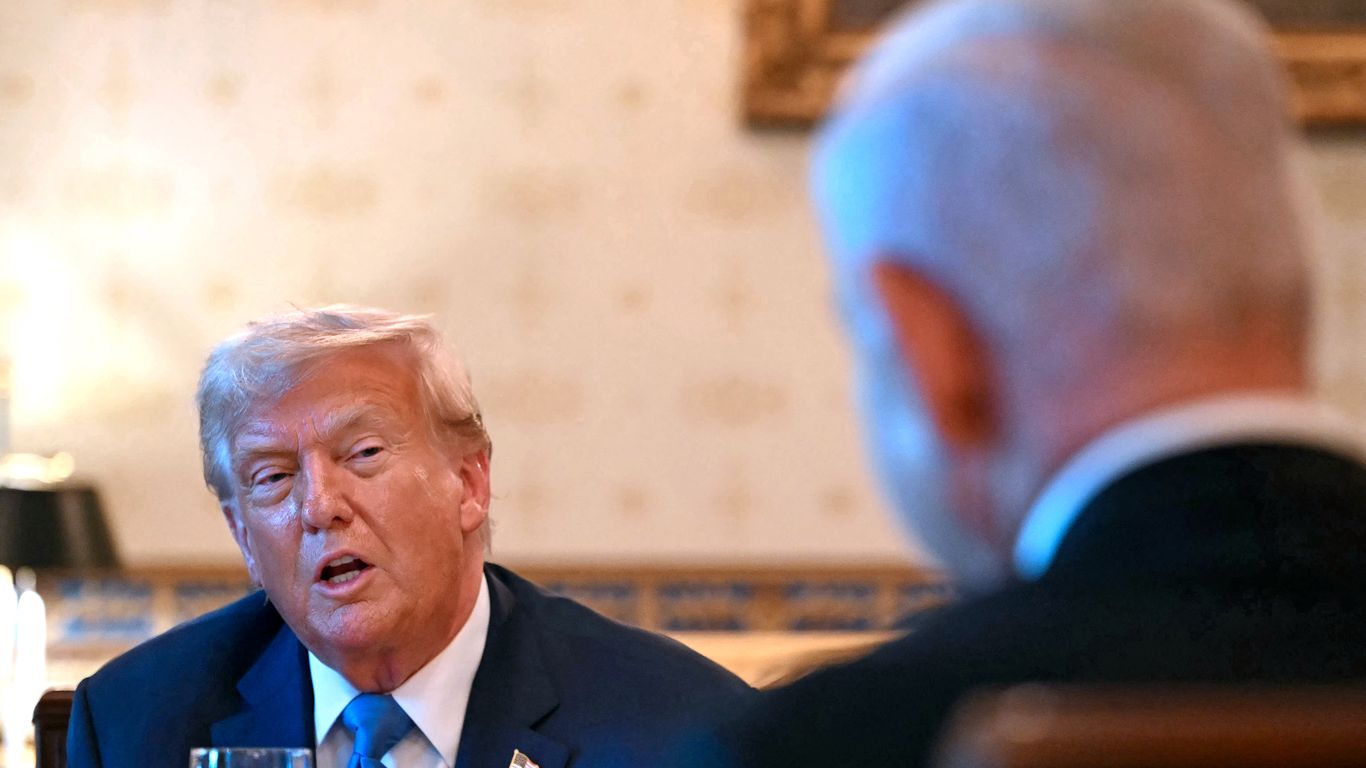Trump's Controversial Move Further Strains U.S.-Arab Relationships
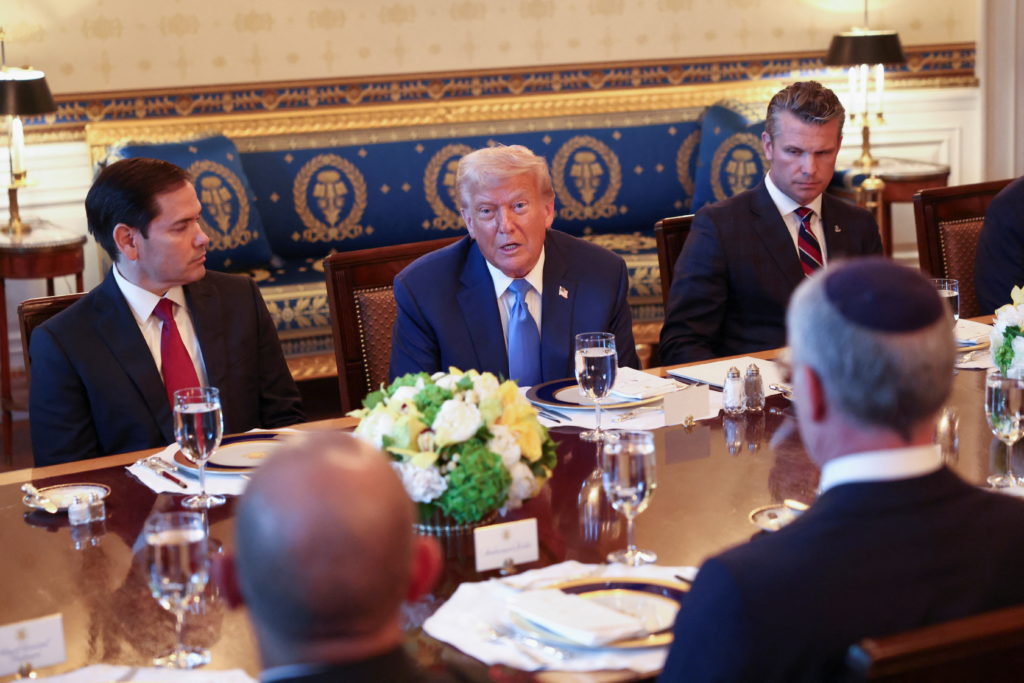
Introduction
In a surprising turn of events, U.S. President Donald Trump has attempted to distance the United States from Israel's recent strike on Qatar, causing uproar among Arab leaders. This comes just months after Trump's warm reception in the region, with extravagant camel parades and lavish dinners. However, the tides have turned as Saudi Arabia, United Arab Emirates, and Qatar all unite in frustration at the attack on Hamas leaders by Israel.
Key Details
The strike on Qatar has caused widespread anger among Arab leaders, with many questioning the role of the United States in the conflict. This move is seen as a betrayal by the U.S. to its Arab allies, and is likely to strain relationships in the region. The strike, which targeted Hamas leaders, has further complicated the already tense situation in the Middle East. This comes amidst Trump's controversial decision to move the U.S. embassy to Jerusalem, which further fuels the anger of Arab leaders.
Impact
The fallout from this incident has the potential to greatly impact not only the relationships between the U.S. and its Arab allies, but also the overall stability in the Middle East. The recent actions of the U.S. and Israel may further escalate tensions and complicate any potential peace negotiations with Palestine. This also highlights the precarious position of the U.S. as a mediator in the region, with its actions being
About the People Mentioned
Donald Trump
Donald John Trump, born June 14, 1946, in Queens, New York, is an American businessman, media personality, and politician. He graduated from the University of Pennsylvania’s Wharton School in 1968 with a degree in economics. In 1971, he took over his family’s real estate business, renaming it the Trump Organization, through which he expanded into building and managing skyscrapers, hotels, casinos, and golf courses. Trump gained widespread fame as the host of the reality TV show *The Apprentice* from 2004 to 2015, which helped establish his public persona as a successful entrepreneur. Trump entered politics as a Republican and was elected the 45th president of the United States, serving from 2017 to 2021. His presidency was marked by significant policy actions including tax cuts, deregulation, the appointment of three Supreme Court justices, renegotiation of trade agreements (notably replacing NAFTA with the USMCA), and a focus on immigration control including border wall expansion. He withdrew the U.S. from international agreements such as the Paris Climate Accord and the Iran nuclear deal, and engaged in a trade war with China. His administration’s response to the COVID-19 pandemic was criticized for downplaying the virus’s severity. Trump was impeached twice by the House of Representatives—first in 2019 for abuse of power and obstruction, and again in 2021 for incitement of insurrection—but was acquitted by the Senate both times. After losing the 2020 election to Joe Biden, Trump challenged the results, culminating in the January 6, 2021, Capitol riot. He remains a central figure in American politics, having won the 2024 presidential election and returned as the 47th president in 2025, continuing to promote policies aimed at economic growth, border security, and military strength[1][2][3][4].
About the Organizations Mentioned
Hamas
**Hamas** is a Sunni Islamist Palestinian nationalist organization that functions both as a political party and a militant group, primarily operating in the Gaza Strip, which it has governed since 2007. Founded in 1987 by Ahmed Yassin amid the First Intifada, Hamas emerged from the Muslim Brotherhood and initially had covert Israeli support as a counterweight to the secular Palestinian Liberation Organization (PLO)[3][1]. It combines political governance with an armed wing, the al-Qassam Brigades, committed to armed resistance against Israel, which it refuses to recognize as a legitimate state[1][3]. Hamas’s political rise culminated in a 2006 electoral victory in the Palestinian Legislative Council, campaigning on anti-corruption and resistance platforms. After violently seizing Gaza from the rival Fatah faction in 2007, Hamas has maintained de facto control there despite international isolation and blockades imposed by Israel and Egypt[3]. Its governance has been marked by repeated conflicts with Israel, including major wars in 2008–09, 2012, 2014, 2021, and the ongoing intense conflict triggered by Hamas’s surprise October 2023 attack killing nearly 1,200 Israelis and taking hostages[1][2][3]. Hamas benefits from regional support, especially from Iran, which supplies funding and weapons, as well as financial and political backing from Turkey and Qatar. These alliances form part of a broader "axis of resistance" against Israel, which includes groups like Hezbollah and Palestinian Islamic Jihad[2]. Hamas also operates fundraising networks globally, sometimes using charities as fronts to support its military activities[4]. The group is designated a terrorist organization by many countries, including the United States, which has increased military aid to Israel following recent escalations[2][6]. Despite modifying its 1988 charter in 2017 to soften some language, Hamas continues to reject Israel’s legitimacy and pursues all forms of resistance[1]. Its enduring political
United States
The **United States** is a federal republic and a global superpower, playing a leading role in economics, military strength, technology, and governance. It is a nation of approximately 348 million people as of 2025, characterized by its diverse population and dynamic economy[8][6]. Founded in 1776 following independence from British rule, the U.S. rapidly evolved into a major world power, especially after World War II, when its technological and economic investments solidified its global dominance[4]. Today, it remains the world’s preeminent military power, with 76% of Americans recognizing this status, while about half view it as the leading economic power globally, though China is seen as a rising competitor[2][3]. The U.S. government operates through a complex system that manages federal finances, taxation, social welfare programs, and trade policies. Recent legislative changes, such as the 2017 Tax Cuts and Jobs Act and the 2025 One Big Beautiful Bill Act, have shaped the tax landscape to influence economic growth, labor markets, and federal revenue[1]. Despite challenges like rising federal deficits projected to reach 6.9% of GDP by 2027, consumer spending remains resilient, and business investment is expected to grow steadily in 2025[5]. In governance, the U.S. is rated "Free" with a score of 84/100 by Freedom House, though concerns about democratic erosion and partisan conflicts persist[6]. Public trust and satisfaction with government services fluctuate, reflecting ongoing debates about policy effectiveness and institutional competence[7]. Technologically, the U.S. maintains a critical edge, underpinning its economic and geopolitical power. Experts warn, however, that technological dominance is not guaranteed indefinitely, emphasizing the need for adaptive policies and international cooperation to sustain leadership in innovation and global affairs[4]. Overall, the United States remains a pivotal force in global business, technology, and politics, balancing historic strengths with contemporary challenges in
Saudi Arabia
Saudi Arabia is a unitary absolute monarchy governed by the Al Saud royal family, with King Salman as the head of state and Crown Prince Mohammed bin Salman holding significant executive power, including serving as Prime Minister since 2022[1][3][8]. The country’s governance structure is based on Islamic law (Sharia), with the Quran considered the constitution, and royal decrees shaping legislation[2]. The King oversees the Council of Ministers, which manages executive functions such as foreign policy, defense, finance, and education[1][2]. Historically, Saudi Arabia was founded by King Abdulaziz Al Saud in the early 20th century, uniting disparate tribes and regions under a single kingdom. Succession traditionally stays within the family, selected by consensus or the Allegiance Council[3]. The kingdom’s political system blends tribal traditions with religious authority, closely aligning with Wahhabi religious leaders for social and political control[3]. Economically, Saudi Arabia is known for its vast oil reserves, with Saudi Aramco being the world’s largest oil company. In recent years, the kingdom has embarked on ambitious reforms under Vision 2030, a strategic plan to diversify its economy beyond oil, attract foreign investment, and develop sectors like tourism and technology[4]. Vision 2030 promotes privatization, corporate governance improvements, and mega-projects such as NEOM, a futuristic economic zone[4]. The Public Investment Fund (PIF), chaired by the Crown Prince, plays a key role in these initiatives by investing domestically and internationally, although it has faced criticism related to human rights concerns and controversial development practices[6]. Saudi Arabia’s legal and business environment is evolving, with reforms in corporate governance and increasing inclusion of women in leadership roles[2][4]. The government permits full foreign ownership in most sectors except strategic ones like oil exploration[9]. Despite economic modernization, the kingdom remains an absolute monarchy with limited political freedoms and human rights challenges[7]. This comple
United Arab Emirates
The **United Arab Emirates (UAE)** is a constitutional federation established in December 1971, comprising seven emirates: Abu Dhabi, Dubai, Sharjah, Ajman, Umm Al Quwain, Fujairah, and Ras Al Khaimah. It operates as a federal semi-constitutional monarchy where each emirate is governed by hereditary rulers known as Sheikhs, with Abu Dhabi and Dubai traditionally holding the presidency and prime ministership, respectively[3][4]. The UAE's political system centers on the **Federal Supreme Council**, composed of the seven emirate rulers, which serves as the highest legislative and executive authority, electing the president and vice president every five years[1][2][4]. The federal government consists of three branches: legislative, executive, and judicial. The legislative includes the Federal Supreme Council and the advisory Federal National Council (FNC), a 40-member body that reviews proposed laws and has seen increasing political participation, including a 50% female representation as of 2019 elections[1][2]. The executive branch is headed by the president, who is also commander-in-chief of the armed forces, the prime minister, and the Council of Ministers (Cabinet), responsible for federal policy implementation across all government sectors[1][2][3]. The judiciary is led by the Supreme Court and federal courts. Historically, the UAE has developed rapidly from a federation of tribal sheikhdoms into a modern state with significant achievements in economic diversification, infrastructure, and technology. The federation's wealth, primarily from oil and gas resources, has been reinvested into sectors like finance, real estate, renewable energy, and technology innovation hubs, making it a leading regional business and technology center[3][7]. The government actively promotes political stability, social justice, and equal rights for its citizens, ensuring a measured expansion of political participation while maintaining firm central control[4][5]. Notably, the UAE is recognized for its visionary leadershi

